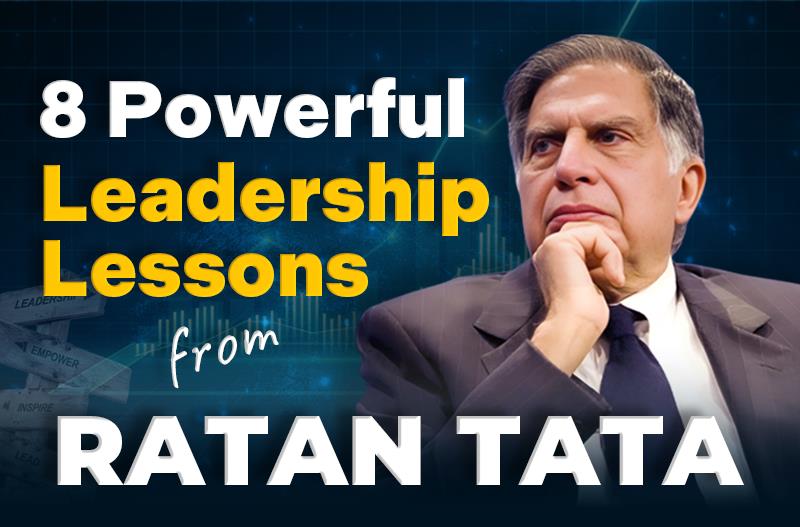Today, Tata Group is a truly global enterprise with business operations spanning over 100 countries across six continents and is one of the greatest companies to emerge from India. Ratan Tata, the former chairman of Tata Sons, is often credited with taking the company to such heights of international glory.
His name is synonymous with vision, integrity and leadership, and his life offers powerful lessons not just in business but also in character, resilience and public service.
1. See the Future Before It Arrives
In March 2009, Tata launched what came to be known as the world’s most affordable car, the Nano. The idea behind the car was simple: average Indian families were travelling unsafely on two-wheelers and buying and maintaining cars was beyond their means. Nano struggled commercially and was surpassed by newer models of cars from other brands, but it remains a symbol of innovation aimed at social good.

Ratan Tata had anticipated shifts in industry and consumer behaviour long before they became obvious, and few business leaders have matched Ratan Tata’s foresight in this regard.
In 2008, the famed British automotive brand Jaguar Land Rover was a struggling company. Tata’s decision to acquire it was seen with skepticism by many. The company surprised everyone within a few years by turning profitable and contributing significantly to Tata Motors’ global reputation. This was nothing short of a masterstroke, evidence that success stems from insight backed by bold action.
2. Take Bold, Thoughtful Risks
Tata became a formidable name in the global tea market when it acquired the British tea brand Tetley, established in Yorkshire in 1837. This marked the largest overseas acquisition by an Indian company at the time. proved a solid long-term bet. Tata had a strong ability to balance risk with long-term vision and was never afraid to step outside the comfort zone.

Similarly, the acquisition of Corus Steel in 2007 gave Tata Steel access to cutting-edge technology and new markets. Even though a global recession followed this, this step
3. Integrity Is a Way of Life
An often talked-about episode from Tata’s business life is his refusal to pay a bribe to secure approval for a proposed airline joint venture with Singapore Airlines. Standing firm in the face of repeated setbacks and political hurdles, he chose not to compromise. This ethical stance, rare in business, earned him respect and admiration. Tata’s leadership was rooted in integrity. He believed that businesses must not only be profitable but also principled. Thanks to these values, Tata Group has consistently ranked high in corporate governance and ethical practices.
What set Tata apart from other industrialists of his generation is that he consistently avoided flashy displays of wealth. He lived simply, drove himself and remained grounded always maintaining a low public profile.
4. Turn Setbacks into Opportunities
In 2006, Tata Motors faced political agitation against its Nano plant that was being constructed in Singur, West Bengal. Challenges never deterred Ratan Tata. He acted quickly. In 2008, the company decided to shift operations to Sanand in Gujarat and ensured the project stayed on track. Tata’s commitment to delivering a low-cost car for Indian families never wavered.
When Mumbai came under terror attacks in 2008, the historical Taj Mahal Palace Hotel, a Tata property, was one of the main targets. When it came to restoring the severely damaged hotel, instead of outsourcing the task, Tata led from the front. He met with the victims’ families personally and announced compensation packages that reflected empathy and responsibility. Employees received full salaries for their expected years of service. The iconic hotel reopened within a month, symbolizing resilience and strength, and making both Mumbai and India proud.
5. Research, Experiment, Innovate
Innovation was a hallmark of Tata Group. Ratan Tata continued this tradition by actively promoting frugal engineering, leading to breakthrough projects like the Tata Nano. He encouraged bold experimentation, even if success wasn’t guaranteed.
The futuristic turn in the automobile industry has been the transition to electric vehicles. It was Ratan Tata who laid the groundwork for Tata Motors’ electric vehicle programme, which is now one of India’s leading EV initiatives. Similarly, at Tata Consultancy Services (TCS), he boosted investments in emerging domains such as artificial intelligence, automation and cloud computing – helping TCS become one of the world’s top IT services firms.
Ratan Tata’s pragmatic and optimistic approach to innovation is encapsulated in his statement: ‘I don’t believe in taking the right decisions. I take decisions and then make them right.’
6. Lead with Empathy
Ratan Tata always treated employees as important stakeholders in the present as well as future of the company. During difficult times, the company avoided layoffs, choosing instead to protect livelihoods. This people-first philosophy earned him high loyalty and trust.
Ratan Tata’s empathetic approach extended beyond his workforce to the wider society. During the COVID-19 pandemic, Tata Group companies pledged over ₹1,500 crore in relief, including efforts to boost healthcare infrastructure, support for frontline workers and vaccine development.
He famously said, ‘If you want to walk fast, walk alone. If you want to walk far, walk together.’
7. Give Back to Society
Ratan Tata believed that wealth is meant to be used to improve lives. Through the philanthropic organization Tata Trusts, which controls 66% of Tata Sons’ equity, he channelled billions into public service. Key areas of its operation include healthcare, rural development, education, nutrition and animal welfare.

He supported the expansion of the Tata Memorial Centre, a premier cancer hospital. He also backed scholarships for Indian students, including significant contributions to Harvard, Cornell, and the Indian Institute of Science.
Tata Trusts established the Small Animal Hospital Mumbai (SAHM), a state-of-the-art veterinary facility dedicated to providing advanced medical care for companion animals such as dogs and cats. Located in Mahalaxmi, Mumbai, this hospital spans over 98,000 square feet and offers 24×7 emergency services.
8. Teach What You Have Learned
Even after retiring as chairman of the company, Ratan Tata remained active and continued to contribute to the country’s future. He became a mentor and investor for several startups focused on clean energy, fintech and sustainable design. Prominent among such investments are Ola Electric, Paytm and Urban Ladder.
Apart from funding, Tata also provided strategic advice and credibility to these new businesses. His belief in youth and innovation continues to inspire a new generation of entrepreneurs and changemakers.
Tata’s Legacy
Ratan Tata set an example of not just corporate success; he demonstrated a model of how businesses can be driven by ethics, empathy and vision. His life reminds us that true leadership lies not just in profit, but in purpose.
The lessons from Ratan Tata’s life are not just for CEOs or business leaders. They are for anyone who believes in doing the right thing, even when the going gets hard. His example reminds us that leadership is about making a difference.
To explore such lessons on leadership and related content in greater depth, explore our curated leadership collection to enhance your management expertise.



